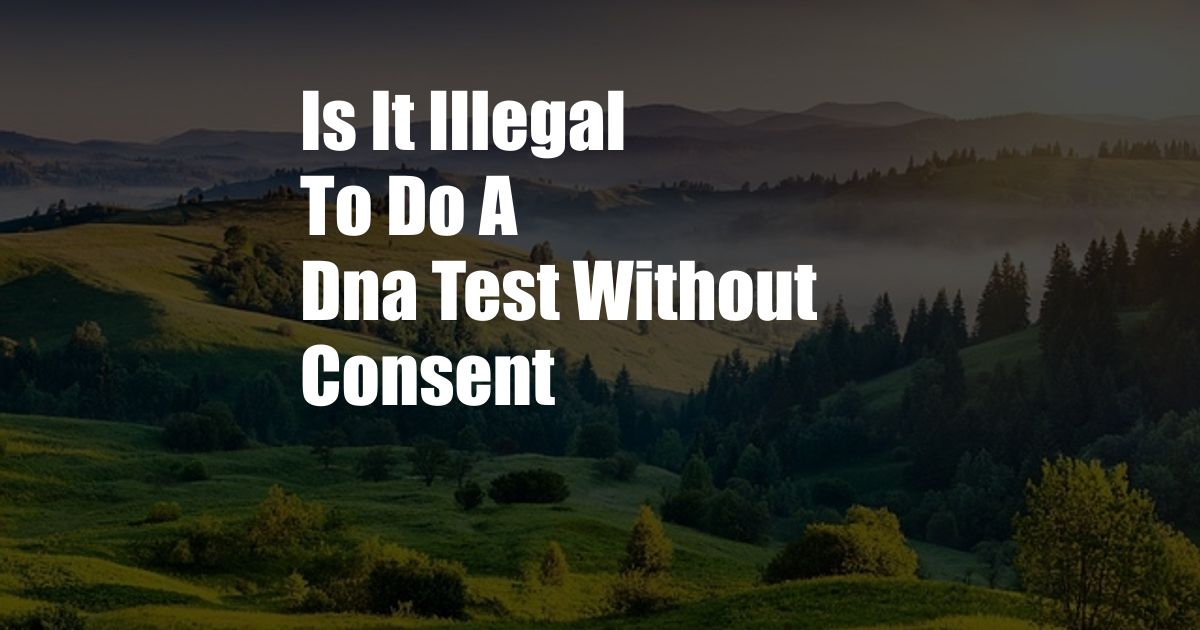
Is It Illegal to Do a DNA Test Without Consent?
In the realm of genetics, DNA tests have become increasingly popular for unraveling ancestry, health predispositions, and family connections. However, the ethical and legal implications surrounding DNA testing without consent raise concerns about privacy invasion and potential misuse.
The concept of informed consent is paramount when it comes to any medical procedure or test, including DNA testing. Informed consent entails providing individuals with all the necessary information about the procedure, its risks, benefits, and potential outcomes. In the case of DNA testing, this includes disclosing the types of data being collected, how it will be used, and who will have access to the results.
The Legal Implications of DNA Testing Without Consent
The legality of DNA testing without consent varies across jurisdictions. In many countries, it is prohibited by law to conduct DNA tests without the explicit consent of the individual being tested. This is because DNA contains highly personal and sensitive information that could be used for discriminatory purposes or identity theft.
In the United States, the Genetic Information Nondiscrimination Act (GINA) of 2008 prohibits discrimination based on genetic information in employment and health insurance. However, GINA does not explicitly address the issue of DNA testing without consent. Some states have passed their own laws to protect individuals from unauthorized DNA testing, while other states have no specific laws on the matter.
What to Do If Your DNA Was Tested Without Your Consent
If you believe that your DNA was tested without your consent, it is important to take steps to protect your privacy and legal rights. You should:
- Contact the company or organization that conducted the test. Demand an explanation for how your DNA was obtained and what information was collected.
- File a complaint with the relevant authorities. In the United States, you can contact the Federal Trade Commission (FTC) or your state attorney general’s office.
- Consider legal action. If other avenues fail, you may consider filing a lawsuit against the company or organization responsible for the unauthorized DNA test.
The Future of DNA Testing and Privacy
As DNA testing technology continues to advance, it is essential to address the ethical and legal challenges it poses. Governments and regulatory bodies must work together to develop clear guidelines and regulations to protect individuals’ privacy and prevent the misuse of genetic information.
Informed consent must remain the cornerstone of DNA testing. Individuals have the right to make informed decisions about their own genetic information. By safeguarding privacy and ensuring ethical practices, we can harness the benefits of DNA testing while protecting the fundamental rights of individuals.
Tips for Protecting Your Genetic Privacy
- Be cautious about sharing your DNA. Only consent to DNA tests when you fully understand the purpose and potential risks.
- Read the privacy policies of DNA testing companies. Make sure you know how your data will be used and protected.
- Consider using a DNA testing service that offers privacy protections. Some services allow you to control who has access to your results.
- Be aware of the potential for genetic discrimination. Laws may not fully protect you from discrimination based on your genetic information.
Expert Advice on DNA Testing and Privacy
Experts in the field of genetics and privacy law emphasize the importance of informed consent and privacy protection. They advise individuals to:
- Educate themselves about DNA testing. Understand the benefits, risks, and potential implications before consenting to a test.
- Be mindful of their digital footprint. DNA can be extracted from saliva, hair, and other bodily fluids that may be inadvertently shared online.
- Advocate for their privacy rights. Contact lawmakers and organizations to support policies that protect genetic privacy.
Frequently Asked Questions (FAQs) on DNA Testing and Consent
Q: Can I be forced to take a DNA test?
A: In most cases, no. In the United States, the Fourth Amendment to the Constitution protects individuals from unreasonable searches and seizures. This includes forced DNA testing without a valid warrant.
Q: What are the penalties for conducting DNA tests without consent?
A: The penalties for unauthorized DNA testing vary depending on the jurisdiction and the specific circumstances of the case. In some cases, it may be a criminal offense with potential fines and imprisonment.
Q: Can I sue a company for conducting a DNA test without my consent?
A: Yes, you may have legal recourse if your DNA was tested without your consent. You could file a lawsuit for damages, such as emotional distress, loss of privacy, or discrimination.
Conclusion
DNA testing can provide valuable insights into our health, ancestry, and identity. However, it is crucial to approach it with caution and respect for privacy. Understanding the legal and ethical implications surrounding DNA testing without consent is essential for protecting our genetic information and safeguarding our fundamental rights.
Are you interested in learning more about DNA testing and privacy? Share your thoughts and experiences in the comments below.